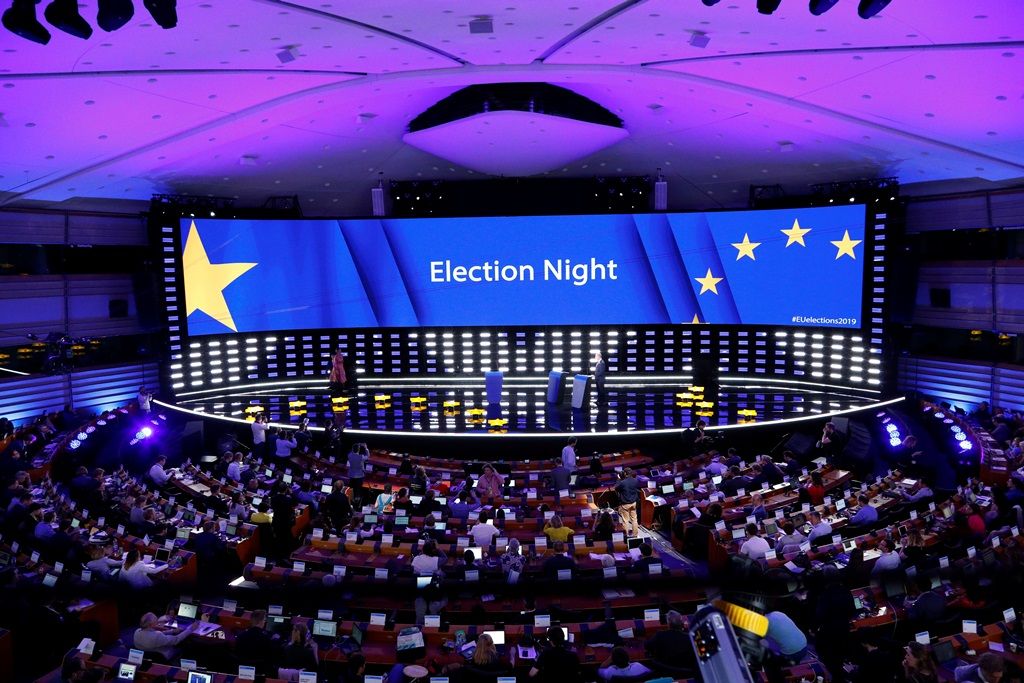UK European Elections: Implications for the Balance of Power in the EP

Conditions and Legal Consequences of the EP Elections
In line with the conclusions of the extraordinary European Council of 10 April, the deadline for ratifying the agreement on the UK’s withdrawal from the EU was extended. This means the country is obligated to hold EP elections under provisions of the EU Treaty.
It is uncertain how long British MEPs will retain their seats. The extension is flexible (so-called “flextension”) and provides that if the withdrawal agreement is ratified, the UK will leave the EU on the first day of the following month. It is possible that if ratification happens in June, which is after the UK’s EP elections, the elected MEPs will not take office. On the other hand, if ratification is postponed again, the British MEPs will hold their seat longer than 31 October.
After the elections, the EP will open with the same number of deputies as now—751. Until the UK formally leaves the EU, implementation of the decision to redistribute some of the UK’s seats (27 out of 73) between 14 Member States will be delayed. This modification was introduced to reflect the demographic changes taking place in the Member States. France and Spain will be the biggest beneficiaries of this change, gaining an additional five seats each. Poland will get one. Under the arrangement, only after Brexit and the UK MEPs leave the chamber will the seats be assumed by the 27 new deputies.
The Likely Result of the UK EP Elections
Two new parties whose programmes are directly related to Brexit will take part in the country’s European elections. The Brexit Party, which explicitly supports the abandonment of the Community was founded by Nigel Farage, an MEP who in 2014 was the leader of the United Kingdom Independence Party, or UKIP, the Eurosceptic party that won the last EP elections. The second new party is Change UK–The Independent Group, which formed in February and is composed of deputies who left the two main parties (Conservatives and Labour), proposing to remain in the EU.
Brexit Party has already managed to climb atop the polls (35%), weakening both UKIP and the Conservatives, with the latter dropping significantly in two weeks from 17% to 9%. In turn, Change UK, though with much less overall support (about 4%), will compete with the Liberal Democrats (17%) and Labour (15%) for the votes of the pro-European electorate. Relatively stable in the polls is the Green Party of England and Wales (11%), which is also firmly opposed to Brexit. Considering the crucial importance of Brexit in the British public debate, Labour and the Conservatives, both internally divided on this issue, are threatened by a further drop in support for the other parties that have an unambiguous stance on the issue.
The likely distribution of seats in the EP assumes a very good anti-EU Brexit Party result and a rather moderate one for Labour. The Social Democrats group in the EP, enriched by a dozen or so Labour mandates, would reduce the gap between it and the largest group, the European People’s Party (EPP). The Alliance of Liberals and Democrats for Europe (ALDE) will also benefit, seeking, along with its current allies, the British Liberal Dems, to attract the Change UK members. The Christian Democrats, not linked to any major British party, also will go after those same members. The ruling Conservatives are likely to be the major loser in the elections. Its representatives will join the European Conservatives and Reformists faction (ECR) but in significantly smaller number than after the last elections.
New EP after UK European Elections
By the end of October, decisions regarding the distribution of key posts in the EU will probably be made. The term of office of the current EC ends on 31 October, so by then its new president and commissioners should be elected. Assuming Brexit happens by 31 October, British MEPs will have the right to participate in the vote approving the candidate for president of the EC, the parliamentary hearings of commissioners-designate, and the vote of confidence in the entire Commission.
The outcome of the election in the UK will not affect a key feature of the political situation in the EP: the only coalition mathematically possible and politically realistic that can control the absolute majority necessary to endorse the new EC president will be an alliance of the Christian and Social Democrats with the liberals. However, the balance of power within this coalition will shift because of the relative weakening of the Christian Democrats in relation to their partners. This may encourage the Social Democrats and the liberals to attempt to block the EPP candidate for EC president and promote one of their own.
Relations within the coalition could become thornier if, thanks to the British mandates, the Social Democrats become the largest political group in the chamber. The polls give the EPP a relatively safe advantage of around 20 seats but a centre-left victory cannot be ruled out, especially given the prospect of the Hungarian Fidesz leaving the EPP group. The Social Democrats’ Spitzenkandidat, Frans Timmermans, could then demand that the European Council present him to the EP as a candidate for the EC presidency. The Christian Democrats would probably then argue that given the temporary nature of the mandate of the British MEPs, their votes should not be considered. The EPP can maintain that this would be in line with the spirit of the European Council conclusions mentioned above in which the Member States expect the UK to participate in the decision-making process “in a manner that reflects its situation as a withdrawing Member State.” The disputes could extend to other positions in the EP—chairpersons and deputy chairs of committees—which the political groups divide amongst themselves based on the number of members.
Internal disagreements within the tripartite alliance may make the swift appointment of a new EC president difficult. To obtain an absolute majority, 376 votes are necessary. According to election forecasts, the centrist coalition will control around 420–430 seats; therefore, if 10–15% of coalition MEPs refuse to support the common candidate, it may endanger the successful conclusion of the procedure. The allies would then have to seek support from the Greens or conservatives.
The likely good results for hard Brexiters in the UK will strengthen the Eurosceptic camp in the EP. If Brexit Party members decide to cooperate with the political group of Matteo Salvini and Marine Le Pen, Eurosceptics would become the third-strongest force in the chamber. However, even a 100-odd-strong political group will not be able to block important decisions.
Conclusions and Prospects
The shifts in the EP balance of power resulting from the UK elections may complicate negotiations around the package of top EU posts but are unlikely to have a decisive impact on their outcome. The latter is only possible if the European Social Democrats win the elections thanks to mandates gained through the Labour Party.
The European elections in the UK will lead to an unusual situation in which MEPs elected in a Member State that wishes to cut ties with the Community gain the right to participate in key long-term decisions. This experience may persuade the remaining Member States to consider changing the conditions for leaving the Union (Article 50 of the EU Treaty). One modification could stipulate that a Member State that has formally expressed its intention to withdraw from the Union cannot participate in European elections. Although a broader revision of the Treaty is very unlikely, building consensus around a limited modification seems feasible.






